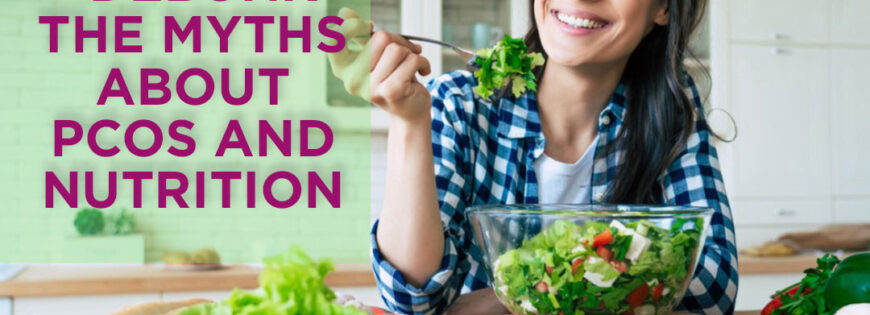What you eat plays a big role in managing PCOS symptoms, but with so much conflicting information out there, it can be hard to know what to believe.
- If you’ve recently been diagnosed with polycystic ovary syndrome (PCOS) or are feeling confused about which nutrition recommendations are most beneficial for managing your symptoms, you’re in the right place.
WHY IS PERSONALIZED CARE IMPORTANT FOR PCOS?
Individualized care is especially important for those with PCOS, because the condition affects each person in a slightly different way. Some struggle with weight management, others battle insulin resistance, and some may only have irregular cycles.
PCOS & NUTRITION MYTHS
Here are a few common nutrition and PCOS myths you might have come across during your research, and our professional recommendations (some of which may surprise you):
MYTH: YOU HAVE TO GO KETO OR NO CARB WITH PCOS
FACT: We do not recommend any diet that cuts out an entire food group (like carbohydrates) or is extremely restrictive (like keto).
The ketogenic diet was specifically designed to reduce seizures in patients with epilepsy. It is not something we typically recommend for patients with PCOS. It is very restrictive and emphasizes high protein and fat intake, which can then negatively affect your lipid panel (i.e. cholesterol, LDL, triglycerides, and HDL).
Why is that important? Patients with PCOS are already at higher risk for heart disease, so a keto diet can end up working against you and increasing that risk even more. Also, our bodies need carbohydrates for energy, so we do not want to eliminate them.
MYTH: GLUTEN FREE OR DAIRY FREE IS BEST FOR PCOS
FACT: Can you tolerate gluten and/or dairy products? Then include them!
Gluten and dairy can both be a part of a well-balanced diet for patients with PCOS.
If you are simply not sure if either one are causing gastrointestinal distress like bloating, diarrhea, abdominal pain, or other negative symptoms, then working with a professional is even more important. Your dietitian can provide specific recommendations for limiting, eliminating, or reintroducing gluten and/or dairy products to determine what is best for you!
MYTH: YOU CAN’T DO HIGH INTENSITY EXERCISE IF YOU HAVE PCOS
FACT: You can include all forms of exercise with PCOS, including HIIT (High Intensity Interval Training) workouts!
Any movement that you find enjoyable (and are motivated to do) is the best one for you – even with PCOS. Exercise can help tremendously with controlling glucose and insulin, as well as being beneficial for heart health and improving energy and mood.
MYTH: YOU NEED TONS OF SUPPLEMENTS TO MANAGE PCOS
FACT: While supplements can be helpful in certain situations, you don’t need to load up on them unnecessarily!
As a registered dietitian, my preference is always that my patients primarily get their nutrition from a well-balanced diet. I typically only recommend supplements if there is a true deficiency (such as vitamin D) or if there is a research-based benefit to adding it.
After reviewing your current blood work, diet and lifestyle habits and medical history, the next step would be to see if there is anything missing. For example, if you are not getting in enough calcium or iron-rich foods, we might suggest other foods to include in your diet, or recommend supplementation if needed.
WHAT IS THE BEST DIET FOR PCOS?
Put simply, the best diet for PCOS isn’t restrictive or complicated.
The best diet for PCOS is a well-balanced one that includes lean proteins, complex carbs, colorful fruits and veggies, and healthy fats.
This can be further individualized when meeting with your dietitian for a nutrition visit, since they will be able to assess several key factors before creating a plan with you. These factors can include things like:
Lifestyle: What’s going to work best for your schedule?
Lab results: Do you have insulin resistance or impaired glucose tolerance? Do we need to consider elevated cholesterol or triglycerides?
Personal preferences: What do you enjoy eating?
YOU CAN GET ALL THE ABOVE MENTIONED HELP WITH OUT DIETITIAN AT OUR CENTRE @www.divyanshihealthcare.com
YOU DESERVE INDIVIDUALIZED SUPPORT!
As you can see, there are many benefits to working one-on-one with a registered dietitian nutritionist – particularly if you are looking to optimize your health, manage PCOS symptoms, or increase your chances of a successful pregnancy.
Always turn to your trusted healthcare professionals with questions before checking in with Dr. Google! By doing so, you’ll know that you are getting the most reliable, current, accurate information possible as you navigate your PCOS journey.



